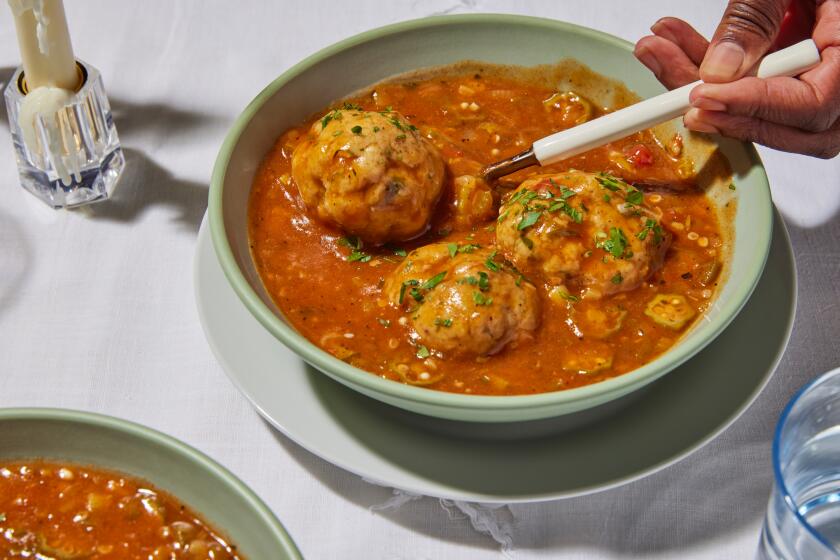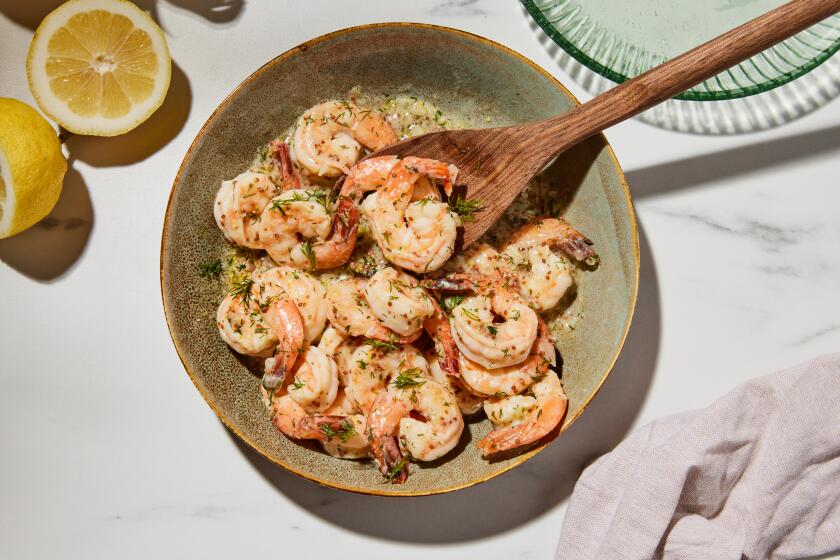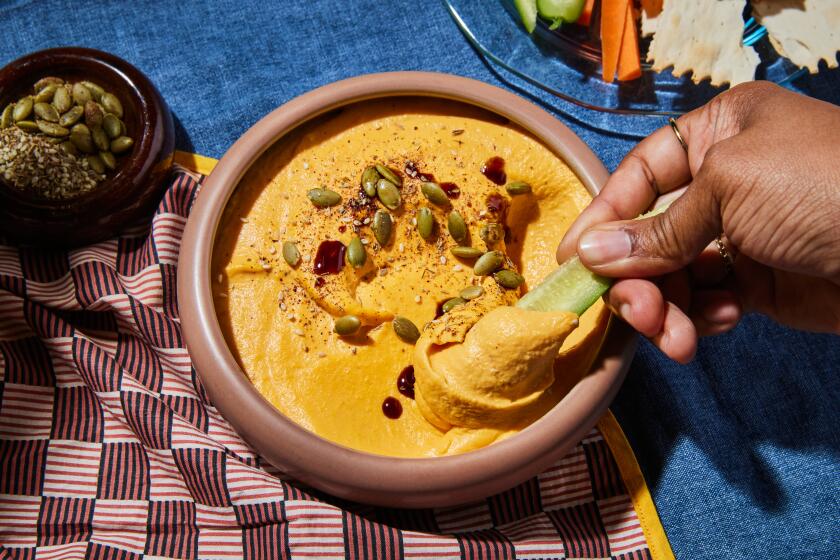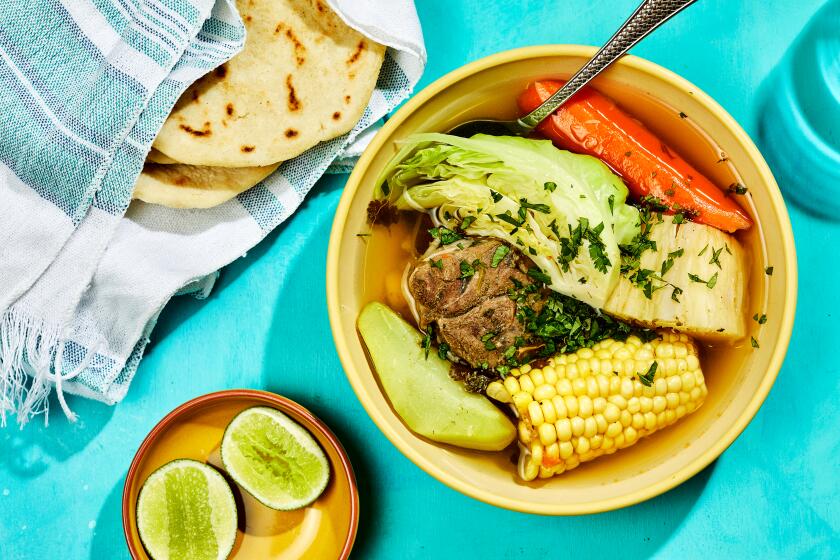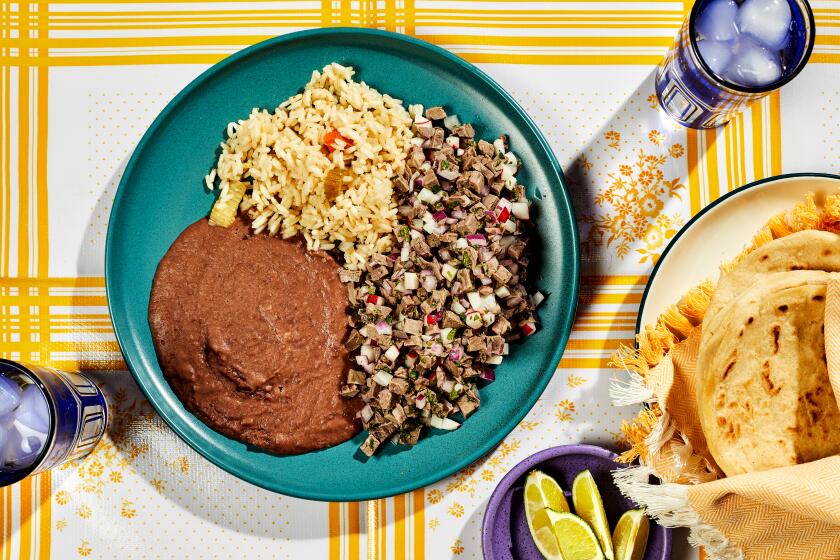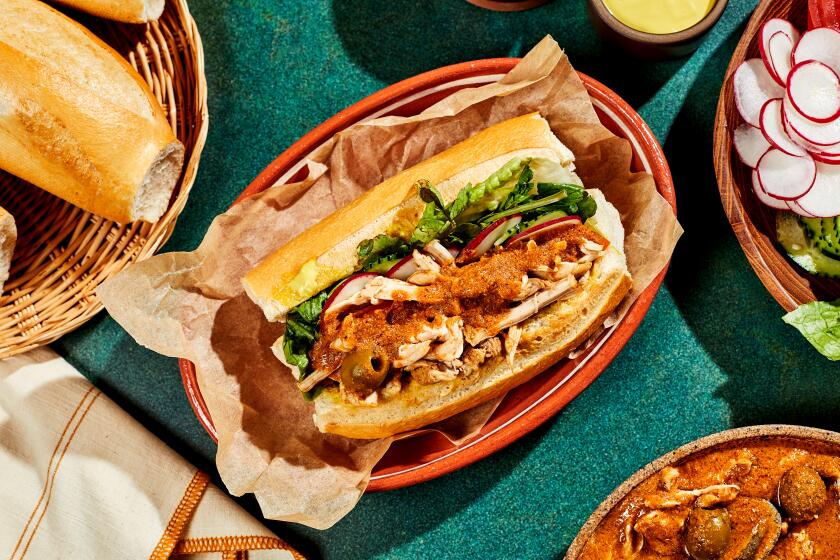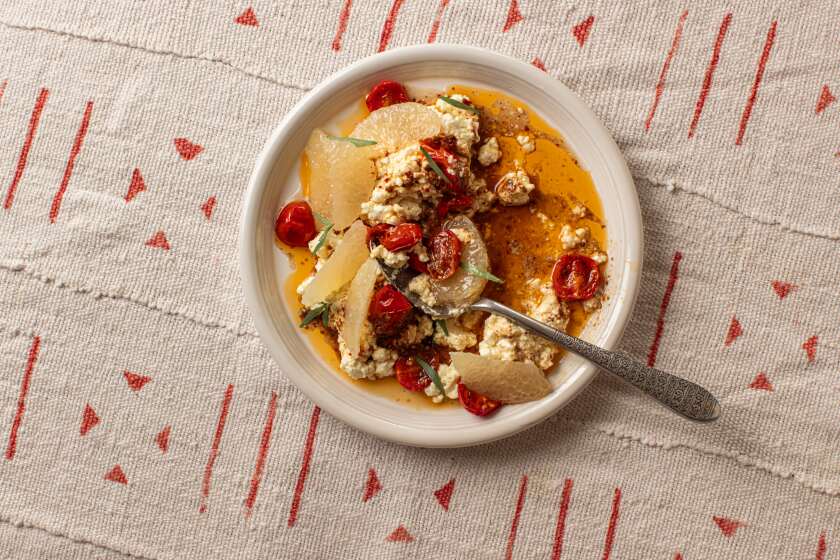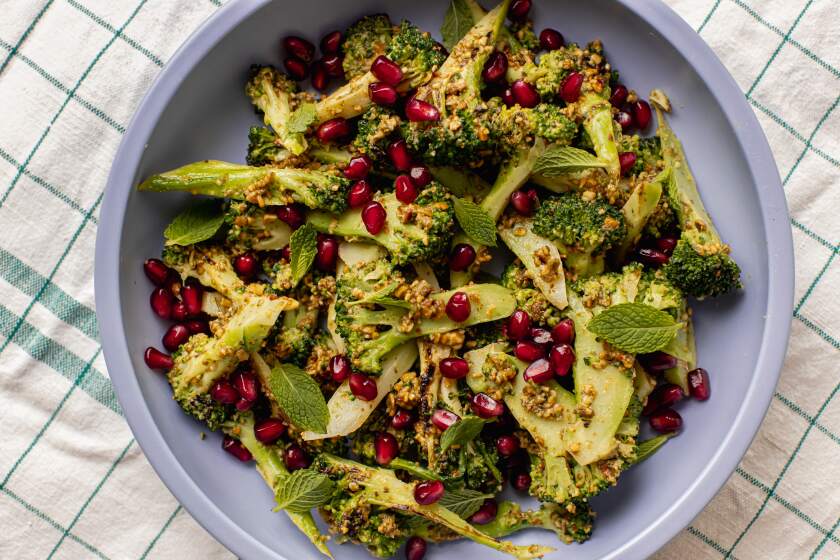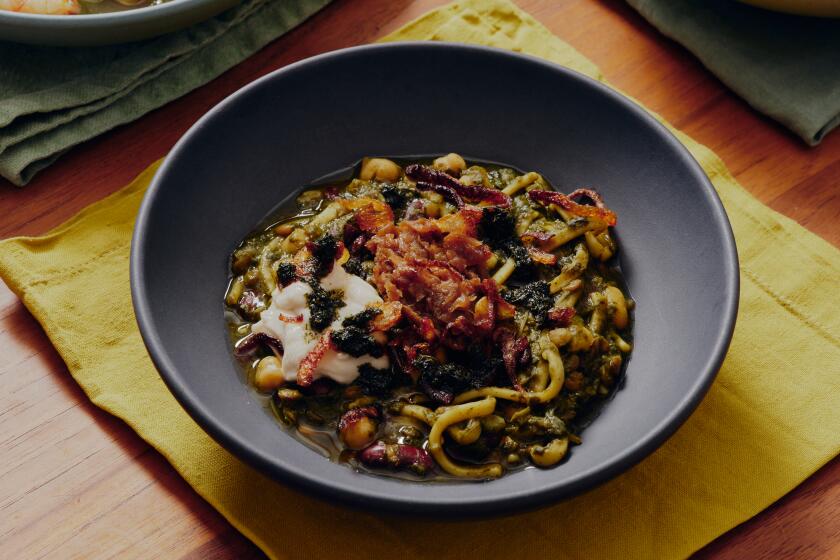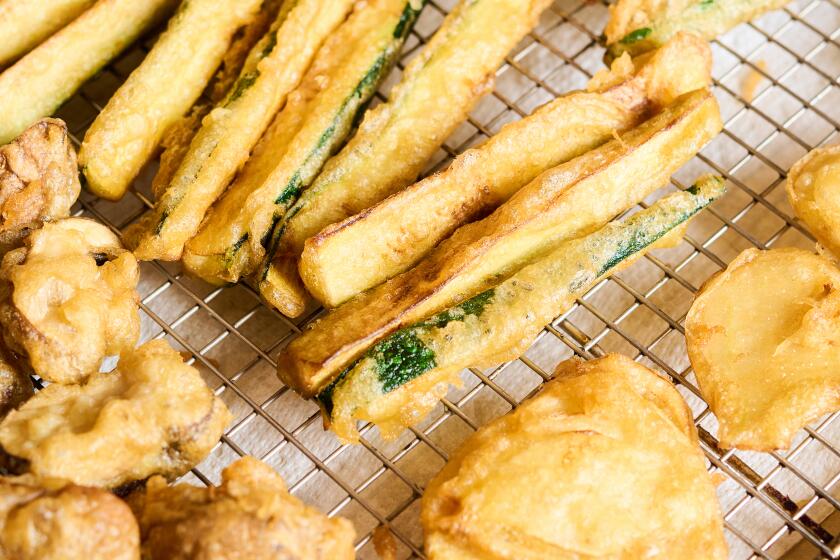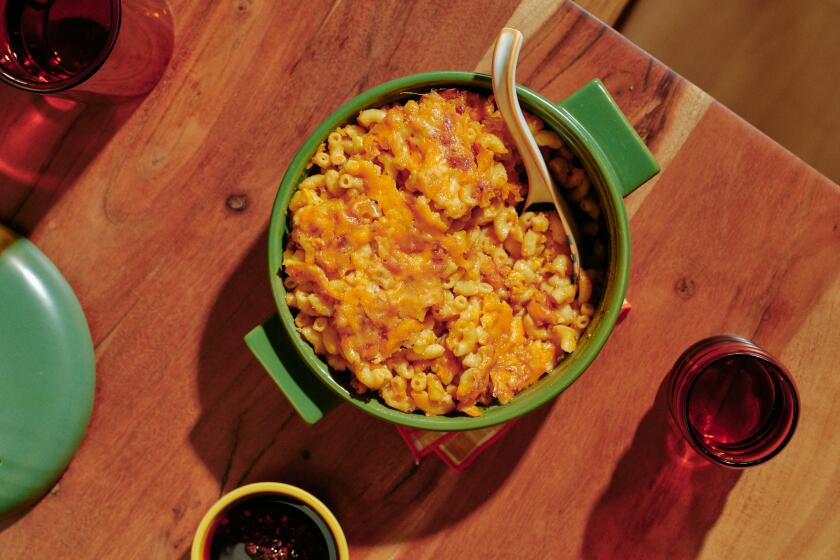Roasted vegetable sandwich

Every summer I wonder if the picnic basket is really an urban myth. Does anyone pack a restrained meal anymore?
The usual splendor on the grass is at least six bulging bags of salads and cheeses from some takeout shop where the olive choices outnumber the prospective ants. Or else it’s a home-cooked feast that can’t be tackled without knife, fork and many napkins while you struggle to keep a wine glass upright on a blanket.
A picnic is supposed to be easy eating, a portable meal that fits all venues from the park to the beach. The ideal entree is something designed to be eaten one-handed, with at least two of the basic food groups loaded into a tidy package that won’t fall apart as you sprawl on the grass or reach for a beer.
That might sound like the definition of a sandwich, but there are sandwiches and then there are sandwiches.
What works for me is one that can be made large and cut down to tidy size when it’s time to eat. I owe my solution to Elizabeth David, the most inspired culinary thinker of the last century. In her book “Summer Food,” she includes a 1932 recipe for a shooter’s sandwich, meant to be taken on hunting trips with nothing more than a knife (well, a flask of whiskey and water too). It’s the perfect model for make-ahead, slice-to-order road food.
You first grill a steak, season it copiously and stuff it into a hollowed-out loaf of bread with a few grilled mushrooms for juice and flavor. You then wrap the whole assemblage in butcher’s paper, tie it with kitchen twine and “let the thing endure pressure for at least six hours.” When it’s finally sliced, you get a solid sandwich, the meat melded to the bread.
It takes more time and work than a BLT, but the result is much more substantial. And it fits right into a picnic basket.
Over the years since I first made this, I’ve constantly tweaked the original recipe. Apparently England in the 1930s had no ciabatta, which makes a far superior casing for the meat since it’s almost all crust and requires no hollowing out. I’ve also found skirt steak is juicier and more flavorful than flank. And I’ve added chipotles for heat, and thyme for spice, although salt and pepper are enough.
The weighting and compressing of the sandwich works so well -- like a panini without the heat of a grill -- that I transferred the technique to the muffuletta. The sandwich, essentially a cold answer to the New Orleans po’ boy, was invented at the Central Grocery in the French Quarter. Think of it as a round hero: a loaf of special Italian bread is sliced in half, dressed with a pungent olive salad and layered with cured meats such as mortadella and salami with plenty of provolone. The oily olives help the sandwich adhere when it’s cut into wedges, but pressing it turned out to make it even more suitable for travel.
The same combination of a round bread and a fat filling works well with a pressed sandwich of eggs scrambled with Spanish chorizo and onions. A layer of Gruyere or Cheddar on the hot filling keeps the sandwich together, while the chorizo adds enough spicy heat that the eggs are still appealing after they cool down.
(An even easier chorizo sandwich can be made with a ficelle, sliced open, brushed with good olive oil and lined with thinly sliced chorizo and mozzarella plus arugula. After it’s wrapped, tied and weighted for only an hour, it holds together almost as well as a panini.)
A fatter baguette will hold roasted zucchini, eggplant and sweet onion, sauced with a tapenade of sun-dried tomatoes, anchovies and basil. If the combination of vegetarians and hunters weren’t so unnerving, it could be called a meatless shooter’s.
All these sandwiches will satisfy the type of picnic planner who knows shopping is as important as cooking. The right bread is crucial: Cottony supermarket loaves are not going to work. You need bread with a serious crust and a sturdy crumb so that it doesn’t turn sodden as it sits. Any bread will go rubbery on you if the weather is too humid, though, so these sandwiches are best saved for a sunny day.
Some cheeses work better than others -- creamy types such as Saint Andre taste great but tend to squirt. Fresh mozzarella is perfect because it’s soft enough to meld with other elements while hanging onto its shape and integrity.
The little things matter a lot too. Most loaves need to be hollowed out, leaving only a “retaining wall” so the filling stays where it belongs without bulging out as it would against a flat surface. The loaf should not be sliced all the way through; a hinge on one side will keep the insides inside.
And anything that gets in the way of decisive bites has to be removed, from the chewy casing on chorizo to the stringy stems on arugula.
The extra effort, though, makes a sandwich worth its weight for any picnic, either the old-fashioned al fresco kind or the increasingly necessary ones, when you find yourself strapped into a tiny seat 30,000 miles above Nebraska on a food-free flight.
Heat the oven to 425 degrees. Cut the zucchini lengthwise into thin slices and place in large bowl. Cut the eggplant and onion in half lengthwise, then crosswise into very thin slices and add to bowl. Add the garlic and half the basil. Drizzle with 4 tablespoons of the oil, then season to taste with salt and pepper. Toss until well mixed and coated.
Transfer the vegetables to 2 large baking sheets. Roast, stirring and turning every 5 minutes, until very soft, 25 to 35 minutes. Set aside to cool slightly.
Combine the tomatoes and anchovies with the remaining basil in a blender. Add 2 to 3 tablespoons olive oil and process until chunky, adding more oil to make a spreadable paste.
Slice the baguette lengthwise, leaving one side hinged. Hollow out the center of each side, leaving a retaining wall all around. Spread both sides lightly with the tomato- anchovy mixture. Carefully lay the roasted vegetable mixture evenly in the hollow. Lay the mozzarella in slices or in mounds over the vegetables.
Carefully close the top half of the bread. Using a spatula, press any protruding cheese or vegetables back into the sandwich. Wrap in waxed paper and tie at 2-inch intervals. Top the sandwich with cast-iron skillets or other heavy weights and let it stand at least 1 hour to compact. To serve, use serrated knife to cut into thick slices.
Get our Cooking newsletter.
Your roundup of inspiring recipes and kitchen tricks.
You may occasionally receive promotional content from the Los Angeles Times.


